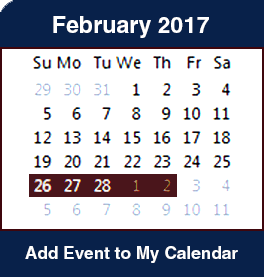
TMS 2017 Course Offerings
Full Day Events
Emerging Electronic Interconnect Materials and Processing for Advanced Packaging Technology Workshop
Refractory Linings Used in Aluminum Production
Half-Day Morning Events
Hands On: Interactive Materials Data Visualization and Selection Tools for Research and Teaching Workshop
Hands On: New Demos and Activities to Engage Students in Materials Science and Engineering Workshop
Managing Sulfur in Cokes, Anodes, and Smelter Potline Exhaust Gases Course
Half-Day Afternoon Events
Additive Manufacturing Materials and Processes Workshop
Emerging Technologies that are Poised to Change the Aluminum Industry Workshop
How Carbon Materials are Used in Aluminum Production Workshop—an Introduction for Non-Technologists
Introduction to Atom Probe Tomography Workshop
|

| Introduction to Atom Probe Tomography Course |
| When | Sunday, February 26, 2017 • 1:00 p.m. to 4:30 p.m. |
| Where | San Diego Convention Center |
| Sponsorship | TMS Structural Materials Division (SMD) and Alloy Phases Committee |
| Organizers | Wei Xiong, University of Pittsburgh, and Shuanglin Chen, CompuTherm LLC |
| Instructors | David J. Larson, CAMECA Instruments Inc.; Dieter Isheim, Northwestern University; Thomas F. Kelly, CAMECA Instruments Inc.; and Michael Moody, Oxford University |
| Flyer |
 View / Download View / Download |
SCOPE
Atom probe tomography (APT) is now one of the most powerful materials characterization techniques. This development has taken place so quickly that it is not described adequately in conventional textbooks, nor is it covered properly in the majority of existing undergraduate or graduate degree courses in materials science. Therefore, there is an urgent need of one professional development course of atom probe technique. It is expected that the course lecture will provide both beginners and experienced users of atom probe with valuable information regarding overview, technical details, and development progress.
TOPICAL OUTLINE
- Basic Physical Principles of the Time of Flight Atom Probe, and Introduction to APT Instrumentation (T. Kelly)
- Specimen Preparation Techniques, and How to Run APT Experiments (D. Larson)
- Methods for 3D Reconstruction of APT Data, and Data Analysis (M. Moody)
- Case Studies: Examples of the Use of APT for a Range of Materials Applications (D. Isheim)
INSTRUCTORS
 David J. Larson
David J. Larson is the director of scientific marketing and applications for CAMECA Instruments Inc. He received his Ph.D. from the University of Wisconsin in 1996. He is currently the president of the International Field Emission Society. His honors include the Burton Medal (Microscopy Society of America), Honorary Staff (University of Sydney), the Cosslett Award (Microbeam Analysis Society), Visiting Scholar (Corpus Christi College, Oxford), and the Innovation in Materials Characterization Award (Materials Research Society). He has ~240 scientific publications and 10 patents.
 Dieter Isheim
Dieter Isheim is a research associate professor at Northwestern University’s Department of Materials Science and Engineering and manages the Northwestern University Center for Atom-Probe Tomography (NUCAPT). After receiving a doctorate in physics and physical metallurgy from the University of Göttingen, Germany, he joined Northwestern for postdoctoral studies in 1996 and was reappointed research faculty in 2002. His main research interests include phase transformations and interfaces in solids and their effects on the properties of structural and functional materials. He specializes in high-resolution nano-scale materials characterization with a focus on atom-probe tomography.
 Thomas F. Kelly
Thomas F. Kelly received his B.S. in mechanical engineering from Northeastern University in 1977 and a Ph.D. in materials science in 1981 from the Massachusetts Institute of Technology. He was on the faculty at the University of Wisconsin-Madison from 1983 until 2001. Kelly was also director of the Materials Science Center from 1992 to 1999. He founded Imago Scientific Instruments in 1999 to commercialize his invention, the Local Electrode Atom Probe, or LEAP. He has been active in the fields of analytical electron microscopy, atom probe microscopy, rapidly solidified materials, and electronic and superconducting materials for over 35 years and has published over 240 papers and 16 patents in these fields in that time. Kelly was president of the International Field Emission Society from 2006 to 2008, and is currently the president of the Microanalysis Society.
 Michael Moody
Michael Moody is associate professor of microscopy of materials in the Department of Materials and Fellow of Trinity College at the University of Oxford. He is a co-author of the text book Atom Probe Microscopy. After completing a Ph.D. at the University of South Australia, he undertook a postdoctoral research position at Tulane University. Returning to Australia, he joined the Australian Centre for Microscopy and Microanalysis at the University of Sydney. He joined the University of Oxford in 2012, to lead the Atom Probe Research Group, which has interests in all aspects of atom probe tomography research. A key focus of his research has been the design of new analytical techniques to improve the accuracy of the reconstruction of atom probe data and to increase the information obtainable from subsequent analysis of the results.
REGISTRATION
Registration for this professional development event is available through the TMS 2017 Annual Meeting & Exhibition Registration Form. Please note that registration for the full TMS Annual Meeting & Exhibition is not required to attend a professional development event. Course materials are included in the registration fee and will be distributed as digital download prior to or after the conclusion of the program as provided by instructors.
Registration Fees:
On or Before January 20, 2017
After January 20, 2017
|
|
|